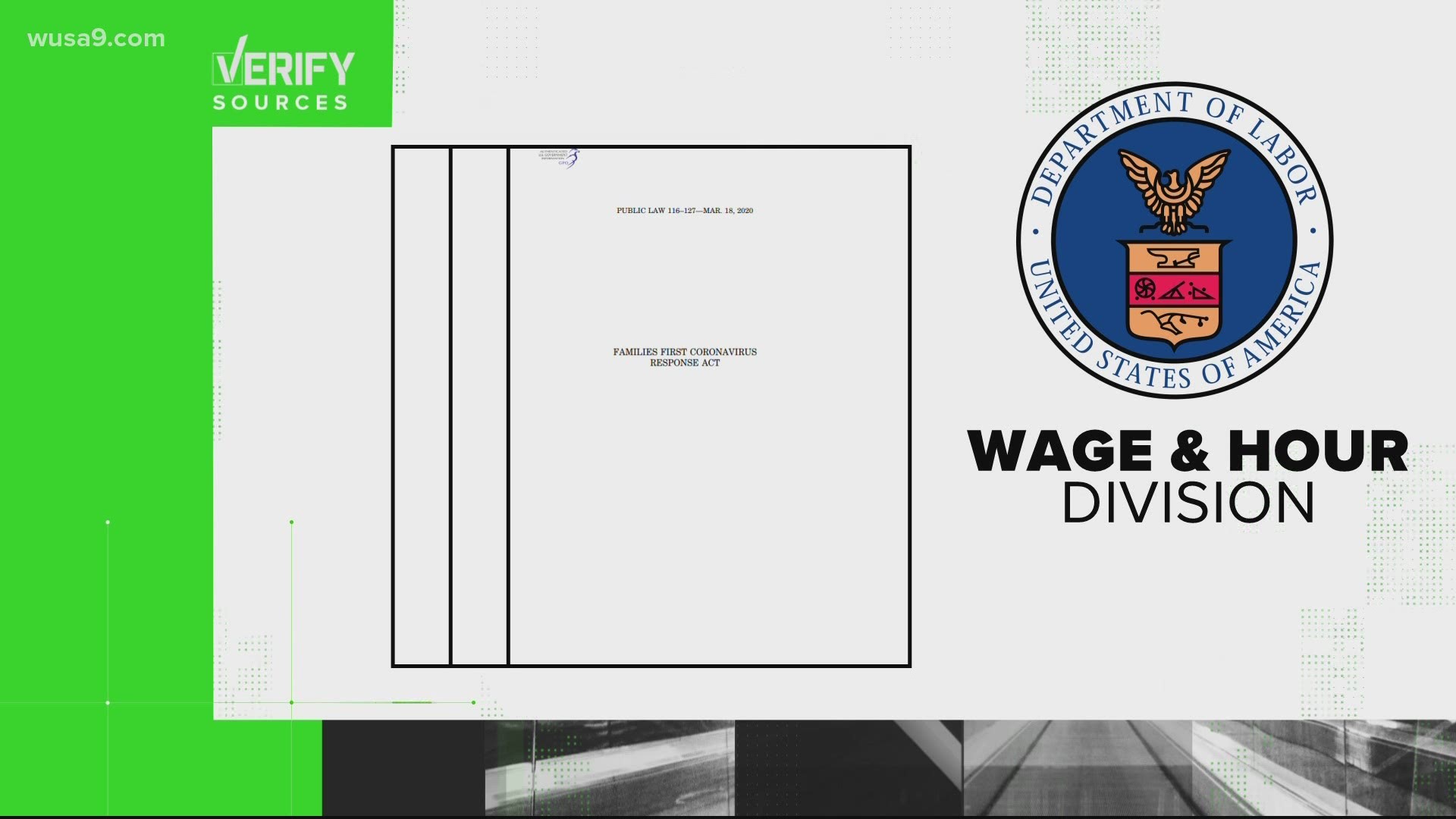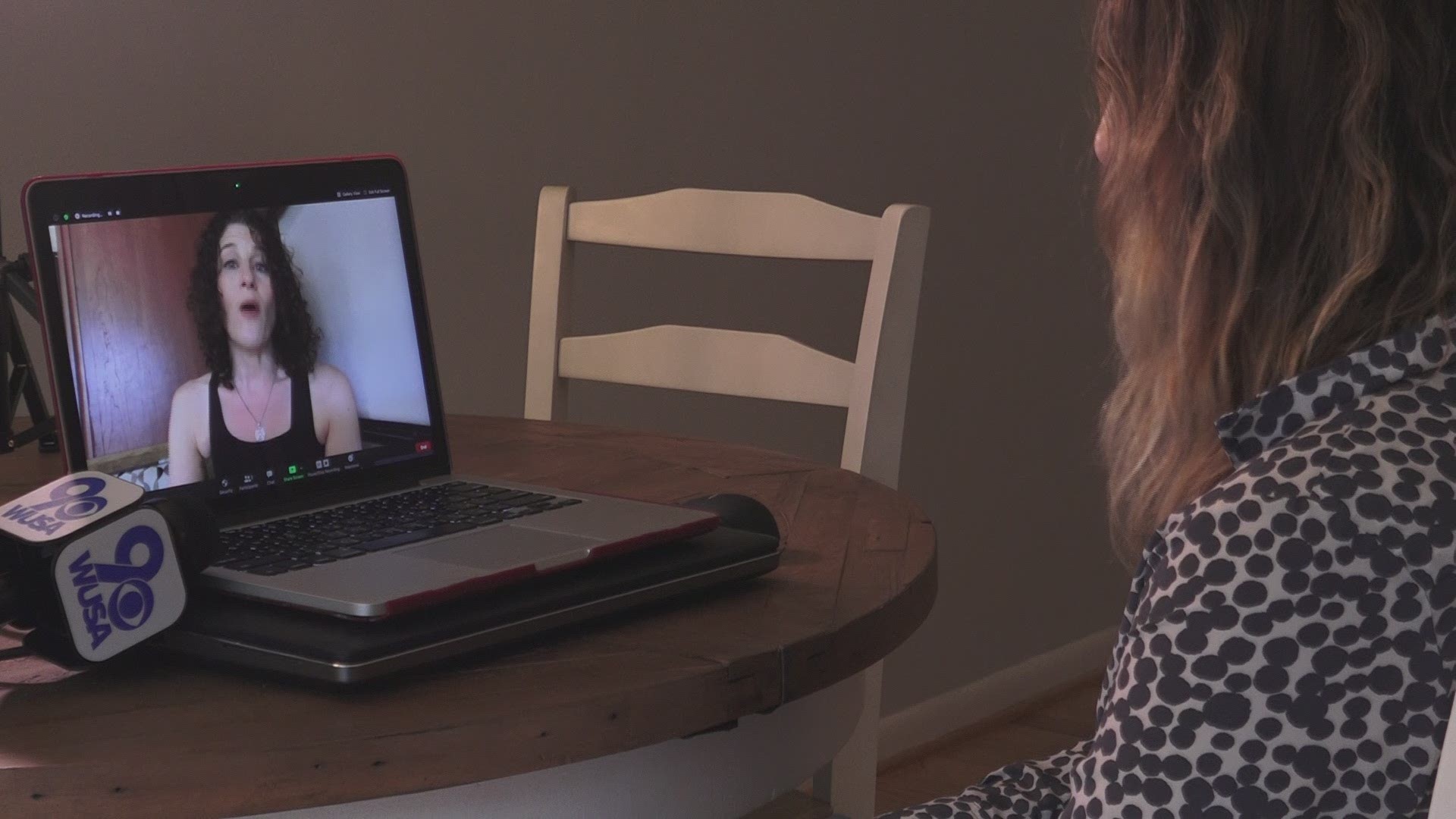WASHINGTON — QUESTION:
What is the Families First Coronavirus Response Act?
ANSWER:
The FFCRA was signed into law on March 18, 2020 and provides certain employees with paid sick leave or expanded family or medical leave in specific scenarios related to the COVID-19 pandemic.
SOURCES:
Families First Coronavirus Response Act- text
Department of Labor Wage and Hour Division- "Families First Coronavirus Response Act: Employee Paid Leave Rights" "Families First Coronavirus Response Act: Questions and Answers" "Families First Coronavirus Response Act: Employer Paid Leave Requirements"
PROCESS:
A viewer emailed the Verify team asking whether they should be getting paid while they await COVID-19 results.
Without knowing specifics about the individual's job, their company and taking into account state laws, it's a tough question to answer specifically. What we can Verify, is that there is at least one resource available from the federal government: the Families First Coronavirus Response Act.
Our Verify researchers looked at the Families First Coronavirus Act and guidance from the Department of Labor's Wage and Hour Division.
According to the Department of Labor, the Act “requires certain employers to provide employees with paid sick leave…for specified reasons related to COVID-19.”
Here’s the thing, when it comes to who would be covered for sick leave under the FFCRA, there are certain requirements both in terms of the employer and employee.
For the employer, the law applies to certain public agencies and private companies with fewer than 500 employees.
On top of that, there are specific employee requirements. To get their regular pay (up to $511 per day/$5,110 in aggregate over the two-week period), an employee must not be able to work or telework and fall into one of these scenarios:
- The employee is under a federal, state or local order to quarantine of isolate related to COVID-19
- The employee has been advised by a health care provider to self-quarantine
- The employee s experiencing COVID-19 symptoms and seeking a medical diagnosis
There are a few scenarios where a covered employee may be eligible for two-thirds of their regular rate of pay.
Separately, the Department of Labor notes that certain health care providers and emergency responders may be excluded by their employer, from getting this leave.
Now if you’re covered under the FFCRA, you’re entitled to up to two weeks off, capped at 80 hours, paid by your employer. Private-sector employers are eligible for a tax credit from the government.
Our Verify researchers asked three employment law experts about some specific scenarios, to see whether an employer would be responsible to pay for an employee's time to get tested and wait for test results:
If an employee attends a non-work-related event, and his/her doctor says to get a COVID-19 test before returning to work, would the employer be required to pay for the time it takes to get a test and a test result? What would happen in this scenario if the employer were the one requiring the test, not the doctor?
Our Verify experts came to different conclusions.
Adam Nadelhaft, an employment lawyer at Charlson Bredehoft Cohen & Brown, P.C., said if either your doctor or your employer are telling you to get a test, then the employer would be required to pay for your time.
"Per the Families First Coronavirus Response Act (FFCRA), the employer would be responsible to pay the employee for up to two weeks for both seeking the medical diagnosis and the quarantine," Nadelhaft said. "That means that if the time goes beyond two weeks, the employer would not be responsible to pay the employees’ salary. Only if the employer required the test, would be the employer be responsible for paying additional time beyond two weeks for the testing and the quarantine."
J. Thomas Harrington, principal at The Employment Law Group, P.C. said that it depends on who's requiring the test.
"If the test was ordered by a doctor, rather than mandated by the employer, based on exposure at a non-work event, the employer would NOT be obliged to pay for the time involved in testing and waiting for a result," Harrington said. "However, the employer’s insurance still must cover the cost of any test."
If the employer is the one requiring testing and you're a covered employee under the FFCRA, Harrington said, the employer should be required to pay for your time to get test results.
"Employers might try and argue that somehow that doesn't apply, but if it's the employer's decision to say you can't come into work until you get your test results, then you know, I think the best reading of the FFCRA is that that would be covered," Harrington said. "But I'm sure there will be disputes about that and courts will need to weigh in."
Diane Seltzer Torre, principal at Seltzer Law Firm and also an adjunct professor of law at American University, said that neither an employer nor a doctor's request for a COVID-19 test would qualify an employee for FFCRA paid sick leave.
"Without COVID-19 symptoms for which the employee is seeking a medical diagnosis, or without the health care provider advising the employee to self-quarantine due to COVID-19, paid sick leave under the FFCRA is not available," Seltzer Torres said.
Seltzer Torre explains why an employee, who is required to get tested for COVID-19 by their employer, would not be eligible for paid sick leave under FFCRA. Take a listen:


